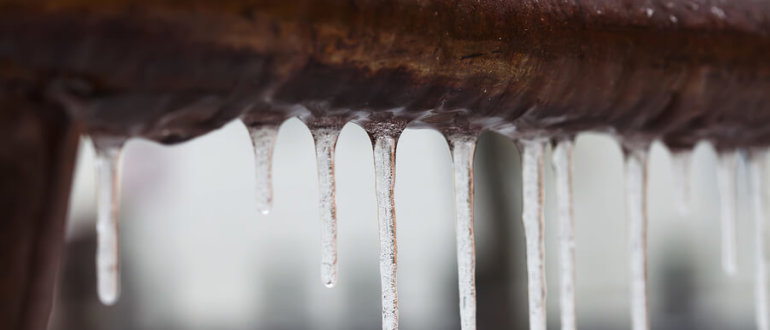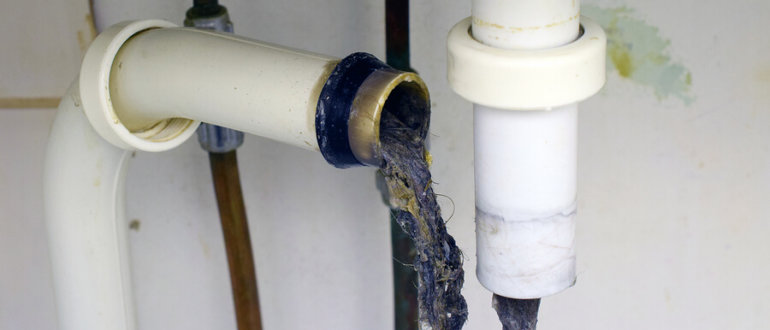Frozen Pipes Are No Joke
It’s difficult to think about winter just yet as the last remains of summer are so close, but the reality is that winter is inevitable. And with it comes some inherent problems when it comes to our household plumbing.
Unless you have experienced it or know someone who has, you may not appreciate that frozen pipes are not only inconvenient but can be extremely damaging to your home and your belongings. One of the most important things to consider when doing regular home maintenance is considering how your plumbing will stand up to winter weather.
Areas That Are More Vulnerable
In many cases, pipes are vulnerable to freezing when the homeowner is away and temperatures inside dip to below freezing. But this is not always the case. Pipes can freeze in certain areas of the home even if you are home and living comfortably inside. When it comes to frozen pipes, there are areas of the home that are most vulnerable.
Exterior walls — any pipes located along the exterior wall of a home will experience lower temperatures. If these pipes are not adequately insulated, they will have no protection against those winter temperatures and can be vulnerable to freezing.
Attics and basements — pipes that are located in attics and basements may be more vulnerable to freezing. Out of sight, out of mind, they say. But these areas of your home may be more susceptible to cold temperatures and require that added insulation.
Early Signs
One of the first signs that your pipes may be frozen is the lack of water coming through them. If water is not coming through your household faucets, it’s a sure sign that there may be a frozen obstruction. If you see frost on any of your pipes or you are experiencing strange smells coming from your drains or faucets, this can be another indication.
What to Do
If you suspect that a pipe may be frozen, it’s important to act immediately. If you know the location that is frozen, you can work to quickly thaw the area or call your Philadelphia plumber for an emergency call.
If you choose to thaw the pipe yourself, you should open both hot and cold handles of the faucet that the pipe feeds into. If the pipe is easily accessible, you can apply heat until you see that water is moving through the faucet. This can be done with a hair dryer, a heat lamp or space heater, hot towels, or electrical heating tape.
If the pipe isn’t accessible, but you know basically where the frozen area is located, you can place an infrared lamp at the location and turn up the heat in the home.
Prevention Techniques
To ensure that you aren’t a victim of a frozen pipe this winter, here are some recommendations from the American Red Cross:
Keep garage doors closed if there are water supply pipes inside.
Open cabinet doors to permit warm air closer circulation to pipes in the kitchen and bathrooms.
If the weather is excessively cold, let water slowly drip from any faucet that may be fed by outside pipes.
Keep the thermostat consistent both day and night. Lower nighttime temperatures can equal costly repairs.
If you leave your home for an extended period, keep the heat on in your home with the thermostat set no lower than 55°F.
Call a Professional
In the case where you have not been able to head off a plumbing emergency due to frozen pipes, call the emergency Philadelphia plumbers at Affordable Fixes LLC.
Don’t Sing Those Summertime Drain Clog Blues
Come summer, you are looking forward to more time outdoors. Maybe you’re even getting that grill ready for barbecue season. The last thing you’re thinking about is your drains. But take it from our Philadelphia plumbers, summer is the time when we get called out for more drain cleaning than any other time of the year.
Preventative Maintenance
Why? With the kids home from school, you may just see more strange things ending up stuck in your drains and flushed down your toilets. Or your husband has decided to shave off that winter beard and there it sits, right in your drain. We like our customers, but you certainly don’t want to be calling us every week for a drain cleaning. Here are some things you can do as preventative maintenance to cut down on those summer clogs.
Lock the Lids
No, Legos aren’t flushable. But tell that to your darlings. Speaking of flushing, lid locks are recommended for households with toddlers. Not only are toilets a potential drowning hazard according to the American Academy of Pediatrics, but it will save many things from going down the toilet that simply shouldn’t be there. Toys and whole rolls of toilet paper are clogs just waiting to happen. Lock the lids of toilets that can’t be closely monitored.
Watch What You Flush
With more people around during the summer, keep mindful of what may get flushed, especially with any water saving toilets. These are more clog-prone that the conventional toilets. But even your standard toilet can get clogged with things that aren’t meant to dissolve like paper towels, napkins, and wipes.
Baskets in the Drains
Hair is the number one clog we deal with and summer means more hair down the drain, not to mention mud, grass and other summer debris. Those little mesh baskets can catch a lot of potential clogging mess before it makes it down your drain.
Disposal Disasters
There’s nothing like fresh fruit and corn on the cob when it comes to summer eating. Burgers? Yum! But grease, fruit pits, and corn cobs can be your disposal’s worst nightmare. Be careful about what you tax your garbage disposal with and make sure to run plenty of water with each use to make sure everything is going down properly.
Don’t Use Those Chemicals
It’s just a little clog. And it looks so simple on TV, right? But those chemicals can do more harm than good. Not only can they be highly toxic, but over time, those chemicals can cause some pretty costly damage to your plumbing. Chemical drain cleaners can actually deteriorate your pipes. In most cases, your Philadelphia plumber can deal with a drain clog in a few minutes.
If you’re dealing with one of those nasty summertime clogs, call our team of professionals. Or better yet, call us for a drain cleaning as preventative care. When you call our skilled Philadelphia plumbers, you can be sure that it’s done right.


